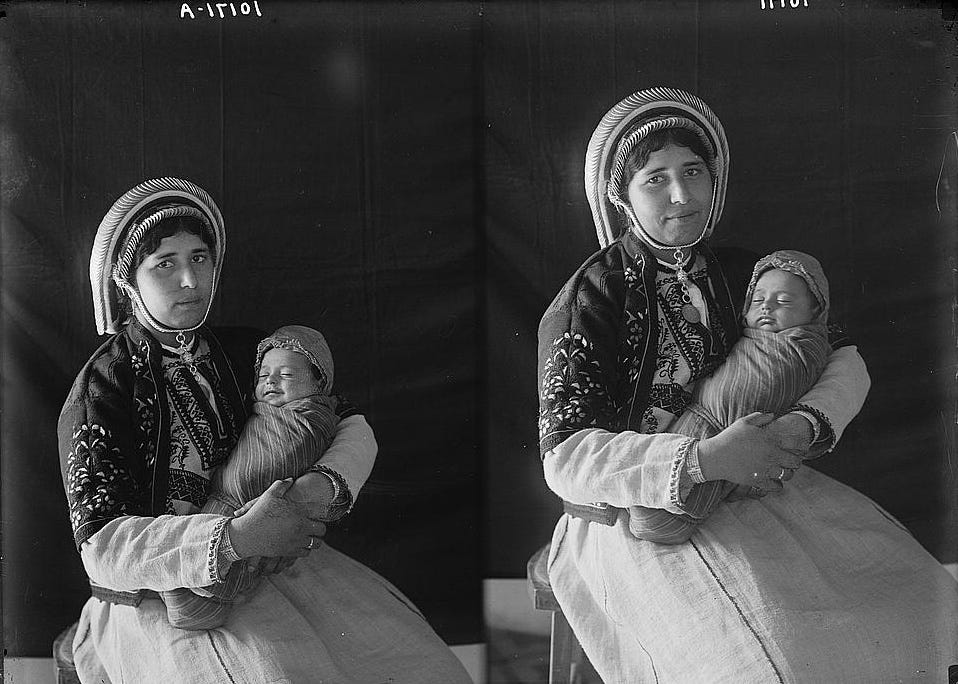My older boy stands in front of me in a pyjama shirt and nothing else, listing nocturnal animals. He raises his hand, counting them on his fingers, and looks towards the open back door. Eyes upwards, so I can see all of his eyelashes. This room is always filled with air and light. It’s the only room in the house we don’t have to monitor for mould.
The open back door is a point of contention between my son and me. He can’t bear the breeze, the way it touches his hair. His baby curls have grown long. I don’t want to cut them and neither does he, most of the time. He only asks for haircuts when it’s windy, vocalising his frustration with grunts and grumbles, an old man for a moment.
When the day goes dark we pile into bed, the four of us. Each to a corner, almost. The baby and I are still a single unit. We leave the windows open. Fruit bats chatter in the bottlebrush.
I breastfeed the baby through the night and watch a genocide unfold through the blue light of my phone. The only other light comes from a battery-operated silicone bear, my son’s portable night light. That, and the streetlight that beams across the bed and up the wall, illuminating the infant in my arms.
Each night a new suite of reposts, a new rendering of the death toll. I see a list of remembrance, over and over again: the names of every child Israel has killed since the start of this most recent bombardment. It’s already out of date. Over 4,000 children since my baby was born a month ago. Now, Gaza has gone dark. They’ve cut off all comms. Someone online: ‘If they killed 750 children in 24 hours with the lights on and the world watching, what will they do in the dark?’
Fruit bats. Sugar gliders. Possums. Owls. Koalas. Bandicoots. Bilbies. My son holds up a finger for each one, hands filling up and starting over. I never get tired of talking to him. I love the feeling of knowledge being passed back and forth between us, his nearly-three-year-old perspective animating my own.
At night, in the quiet, I see things I don’t want to see. At first I reject the righteous directive to not look away. I’m a postpartum mother; I’ve achieved my moral superiority quotient. I should be protecting my energy field, honouring my sacred rest, etcetera. Am I crippled or fortified by tenderness? What else can I carry? Images break through.
Like a mother quietly grieving over a small body wrapped in white. Whispering words in a shrouded ear as she cradles the body to her face. A body small enough to do that.
I see words: an account of the voices of children calling for help from underneath the rubble. Traumatised civilians unable to save them.
More horrors: the hospitals so starved of resources surgical procedures must be performed without anaesthetic, including caesareans. Amputations.
NICU wards that have so far survived the bombings now threatened by loss of power. Rows of incubators, rows of tiny lungs.
A new designation: WCNSF. Wounded child, no surviving family.
Newborn babies cut from dead mothers’ bodies.
Interrupting all of this is regular Instagram: weddings and memes and Halloween and TV stills of Chandler Bing because Matthew Perry drowned in his hot tub (sad). I used to open this app to numb out, and I still do, but right now the numbing is punctured by horror and grief and my reflex is to open the app to numb myself against it in a kind of glitched feedback loop.
I divert myself back to my children. It brings me joy to even qualify to use that word: children. The older one cradles the newborn, an arm across his shoulders. A hand on his cheek. Mimicking the gestures of care he’s seen and received.
Lately it’s impossible not to associate the word ‘children’ with a skyrocketing death toll. I’ve revised the tallied dead several times over the course of writing this. The rest of the school year in Gaza was cancelled because there is almost no one left to go to school, perhaps even no school to go to. My phone transmits successively awful developments like these and they echo around Instagram for a day or two until the next wave of body counts. The children of Gaza — their trauma, their loss — seem to have become a framework, a lens. A means of understanding, of metabolising atrocity.
Again, I look to my own children. The blueprint is here, in this postpartum bed, under their limbs and the streetlight. Their warm bodies, damp with sweat where their skin meets mine.
The older boy often falls asleep with his head on my shoulder as I sit up feeding the baby. I shift him over, help his head find the pillow. He’s not little anymore. His body is heavy, becoming a child’s. Later, when he wakes, I’ll roll over and wrap my free arm around him, contorting my body so I can lie between him and the feeding baby, holding them both as long as I can bear it. Both of them, for now, still small enough that I can do that.
In Gaza, families go to sleep the same way we do. That way, when the bombs fall, they can all die together.






That was really beautiful. I like how the style feels so immediate and intimate.